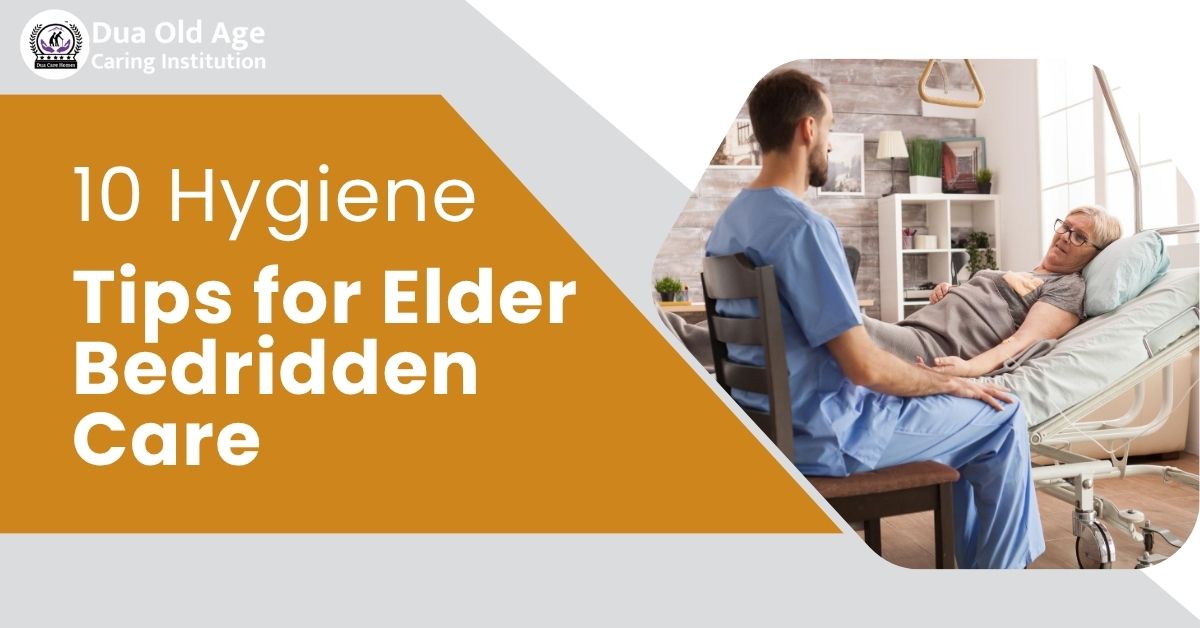Providing elder bedridden care is a responsibility that goes beyond medical support. It involves compassion, patience, and above all, attention to hygiene. Proper hygiene not only prevents infections but also preserves the dignity of your loved ones. Whether you’re a caregiver, nurse, or family member, maintaining hygiene for bedridden elderly individuals is crucial for their overall well-being.
In this article, we’ll cover 10 practical and essential hygiene tips to improve the quality of elder bedridden care at home or in a caregiving facility.
Why Is Hygiene So Important in Elder Bedridden Care?
When someone is bedridden, their mobility is significantly reduced. This increases the risk of:
- Bedsores and skin infections
- Urinary tract infections (UTIs)
- Respiratory issues due to poor air quality
- Emotional distress caused by unclean environments
Practicing consistent hygiene is key to preventing these problems and ensuring that elder patients feel respected and comfortable.
Top 10 Hygiene Tips for Elder Bedridden Care
1. Daily Sponge Baths or Bed Baths
Even if the elderly person cannot bathe in a traditional way, daily cleansing is essential. Use warm water, mild soap, and soft cloths. Focus on skin folds, underarms, and groin areas where moisture and bacteria collect.
Tip: Always keep the room warm and maintain privacy to promote dignity.
2. Maintain Clean Bedding
Change bed sheets, pillow covers, and blankets every 2-3 days, or immediately after any spills or accidents. This prevents skin irritations and provides a fresh feeling.
3. Use Moisturizers and Barrier Creams
Bedridden elders often suffer from dry or fragile skin. Use fragrance-free moisturizers and apply barrier creams to protect skin from urine or sweat.
Pro Tip: Apply after every cleaning or bath for best results.
4. Oral Hygiene Is a Must
Use a soft-bristle toothbrush or sponge swab to clean the teeth and mouth at least twice a day. If dentures are used, clean and remove them every night.
Importance: Poor oral hygiene can lead to infections that may spread and affect overall health.
5. Hair and Scalp Care
Even if washing the hair is difficult, use a dry shampoo or no-rinse cleanser to keep the scalp clean. Combing hair daily also stimulates blood flow and prevents matting.
6. Nail and Hand Hygiene
Trim nails regularly to prevent scratching or infection. Clean hands multiple times a day, especially before meals and after toileting.
EEAT Note: Proper hand care reduces microbial load and maintains cleanliness, a sign of high-standard elder bedridden care.
7. Perineal and Incontinence Care
Use gentle wipes or lukewarm water to clean the genital area after every bowel or bladder movement. Always wipe front to back to prevent UTIs.
Fact: Incontinence is common in bedridden elders; hence, perineal hygiene is non-negotiable.
8. Use Adult Diapers Correctly
Ensure the diaper is changed regularly and fits well to prevent leaks and rashes. Never leave a wet or soiled diaper for long.
Quick Tip: Use breathable, hypoallergenic products for better comfort.
9. Keep the Environment Clean and Fresh
Sanitize frequently touched surfaces like bed rails, side tables, and mobility aids. Ventilate the room and use air purifiers if possible.
Impact: A clean space positively affects mental health and prevents respiratory issues.
10. Regular Skin Checks
Check for redness, blisters, or pressure sores daily. Early detection helps in quick treatment and prevents complications.
Certainly! Here’s the revised Conclusion with a strong and natural promotion of Dua Old Age Caring Institution, maintaining excellent SEO and E-E-A-T principles:
Conclusion: Make Hygiene a Priority in Elder Bedridden Care
Delivering high-quality elder bedridden care means going beyond physical assistance—it’s about ensuring cleanliness, dignity, and emotional well-being every single day. By following the hygiene tips shared above, you can effectively prevent infections, uplift mental health, and enhance the overall quality of life for your elderly loved ones.
However, providing round-the-clock care at home can be overwhelming. This is where Dua Old Age Caring Institution makes a remarkable difference. Known for its compassionate approach, experienced caregivers, and top-notch hygiene standards, Dua stands out as a trusted name in elder bedridden care. Their team ensures that every resident receives personalized attention, medical support, and the dignity they deserve—just like family.
If you’re looking for a place that truly understands the delicate needs of bedridden elders, Dua Old Age Caring Institution offers a safe, sanitized, and caring environment where your loved ones are treated with love, respect, and professional expertise.
Because at Dua, caring is not a duty—it’s a heartfelt promise.
Let me know if you’d like a version of this article designed as a brochure, flyer, or SEO landing page for Dua Old Age Caring Institution!
Frequently Asked Questions (FAQs)
Q. How often should I give a sponge bath to a bedridden elder?
A. Ideally, once a day. However, more frequent cleansing might be needed depending on incontinence or sweating.
Q. Can poor hygiene cause bedsores?
A. Yes, unclean and moist skin can break down faster, increasing the risk of pressure ulcers.
Q. What’s the best way to clean a bedridden elder’s hair?
A. Use no-rinse shampoo caps or dry shampoo between washes to maintain scalp hygiene.
If you are seeking professional support for elder bedridden care, always consult with certified caregivers or elder care institutions to ensure the highest standards of hygiene and compassion are met.


